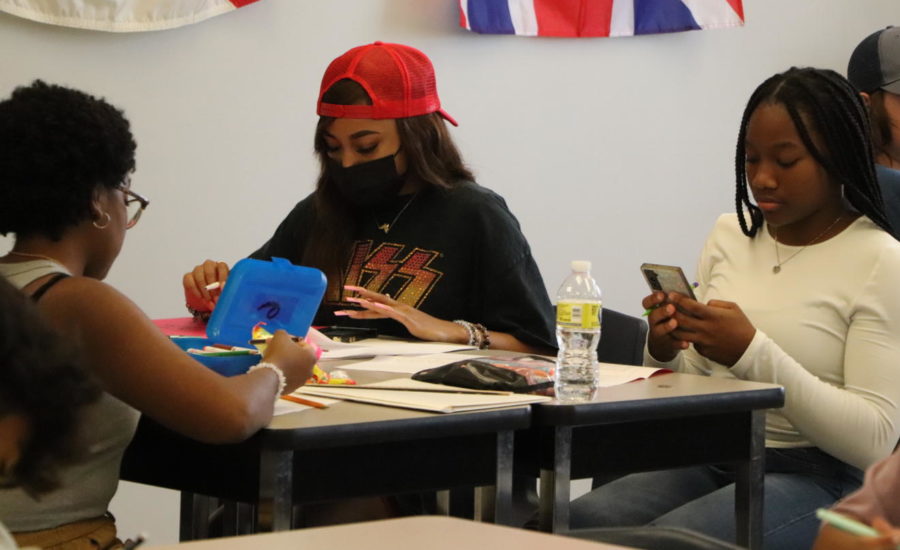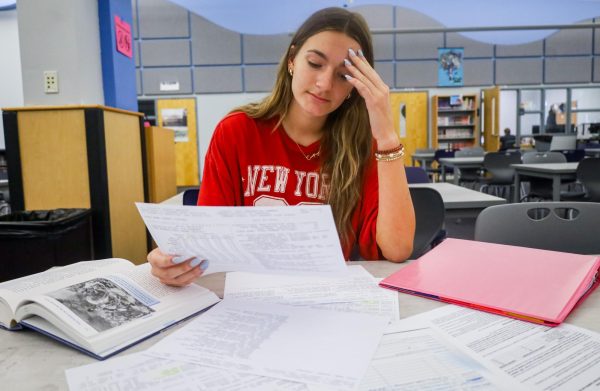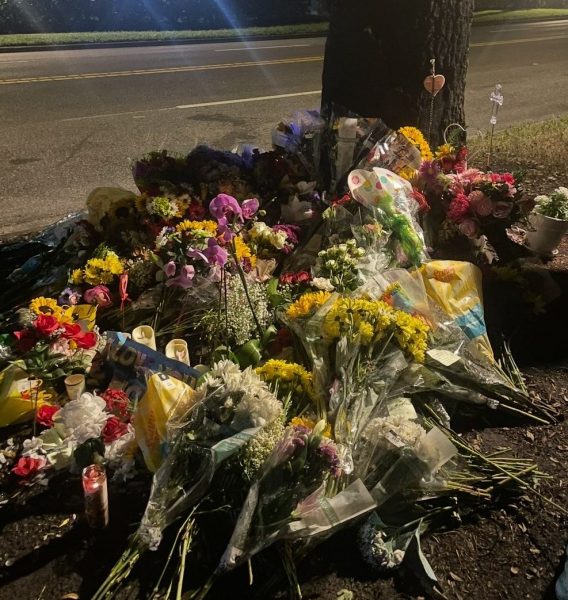AP African American Studies rejected
photo by Nadia Knoblauch
Senior Jasmyne Johnston, freshman Zenthani Wilson and frehsman Suriyah Ali work on an assignment during sixth period African American Studies class. The honors class was offered for the first time in 2022-23, and an AP level class was scheduled to be offered in all Seminole County high schools next year, but the state denied the course.
When senior Verona Hall first found out that African American Studies would be offered as an AP course, she was delighted. However, those hopes were dashed as the state of Florida rejected the AP African American Studies course on Monday.
“I [feel] that the history of African Americans shouldn’t be ignored [because] it is a very important part of America’s history as well,” Hall said.
With the introduction of the non-AP, honors-level African American Studies course for the first time this year, students like Hall were looking forward to the AP course with hopes of diversity among course selection. However, it does not seem like the course will be offered any time soon.
Gov. Ron DeSantis, along with the Florida Department of Education, denied the AP course, citing reasons that it violated state laws and touched on topics that the state did not see fit. However, many critics argue the decision was motivated by politics instead of true educational value.
“We were planning on [offering the course], but obviously we take our direction from the governor, so we are not going to be able to offer that,” assistant principal Kristi Draus said.
According to school administrators, the course was planned to be offered as a pilot to schools in Seminole County, but was shortly removed after the announcement of the governor’s decisions. There is a possibility that if the revised framework for the course—releasing on Feb. 1—is accepted, the course could still be offered.
The original coursework for the class, incorporating topics like intersectionality and books the state claimed were aligned with critical race theory, was released by a local Florida newspaper after the decision was officially announced. The teachings did not align with the ideas of the Stop W.O.K.E Act, also known as the Individual Freedoms Act, which would prohibit teachers from educating students about “woke” topics.
Although the FLDOE issued this decision, many educators do not feel like this was the right choice.
“Any time there’s an educational opportunity that’s missed for kids, I think that’s unfortunate,” African American Studies teacher Amy Bingham said. “[But] we as public school employees have to be in compliance.”
The students also feel that not having the class would be a missing piece in education that could have reverberating consequences in the future
“I think there will be less people willing to learn about African American history in college because they weren’t introduced to it in high school,” Hall said.
Although AP African American Studies is no longer an option, new history courses like Holocaust Studies will provide students with a more diverse selection of courses. Despite topics that might be similar to the denied AP course, both the Holocaust Studies and African American Studies courses are expected to continue as planned.
“We had a Holocaust education mandate before, but under Gov. DeSantis, that mandate has been expanded,” history teacher Megan Thompson said.
However, given the political climate, there is concern for the classes to have more oversight than they normally might.
“There’s been [more of] a focus on instructional materials, people might start looking at materials more closely,” Draus said.
Despite the close attention to details, there is no concern that either course will be dropped. Administrators at the school and county levels have looked to offer classes with a greater variety of viewpoints on important periods of history; however, that has been overshadowed by the refusal of the AP class. The story has gained national attention, and at the state level, three students are threatening to sue the DeSantis administration.
Although the direction of the course is not what she foresaw, Draus still has hope for the future of it.
“I’m hopeful that maybe the College Board will clarify what’s in the course and maybe that’s a little bit naive of me, but I am hopeful that maybe there will be a change and we will be able to offer it,” Draus said.
Your donation will support the student journalists of Hagerty High School. We are an ad-free publication, and your contribution helps us publish six issues of the BluePrint and cover our annual website hosting costs. Thank you so much!











